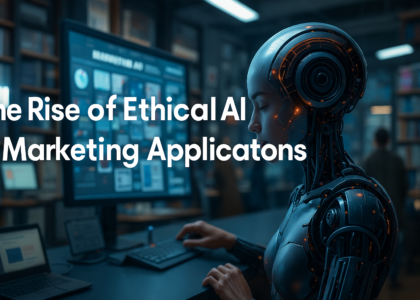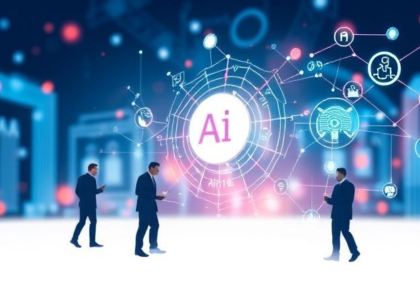
In the rapidly evolving landscape of digital marketing, artificial intelligence (AI) has emerged as a game-changer, transforming the way businesses connect with their audiences. As we move further into 2024, AI’s role in content marketing has become more prominent, offering innovative solutions that enhance efficiency, personalization, and overall impact. From automating content creation to optimizing distribution strategies, AI is not just a tool but a strategic partner that can elevate marketing efforts to new heights.
However, with these advancements come challenges that marketers must navigate to fully leverage AI’s potential. Understanding how AI can be effectively integrated into content marketing, while addressing concerns such as data privacy, the balance between technology and creativity, and the need for high-quality data, is crucial for success.
This blog explores how AI is revolutionizing content marketing in 2024, delving into the benefits, challenges, and real-world applications that are shaping the future of digital marketing. Whether you’re a seasoned marketer or just beginning to explore AI’s possibilities, this comprehensive guide will provide you with the insights needed to stay ahead in an increasingly competitive landscape.
The Evolution of AI in Content Marketing
The integration of AI into content marketing began with basic automation tools that simplified repetitive tasks such as scheduling social media posts and sending out newsletters. Over time, AI’s role has expanded significantly, enabling marketers to analyze vast amounts of data, predict trends, and even generate content.
Today, AI is capable of much more. It can understand and interpret language, identify patterns in consumer behavior, and make real-time adjustments to marketing strategies. This evolution has opened up new possibilities for content marketers, allowing them to engage audiences in more meaningful and personalized ways.
AI-Powered Content Creation: Beyond Automation
One of the most significant impacts of AI in content marketing is in the area of content creation. AI-driven tools are now capable of generating high-quality content that resonates with target audiences. These tools can produce blog posts, social media updates, product descriptions, and even entire articles with minimal human intervention.
AI content creation goes beyond simply automating the writing process. It involves using machine learning algorithms to analyze existing content, identify what works best, and apply those insights to generate new content that is optimized for engagement. For example, AI can analyze the tone, style, and structure of top-performing articles to create content that mirrors those characteristics.
Moreover, AI can assist in creating content that is highly relevant to specific audience segments. By analyzing data such as search queries, social media interactions, and user behavior, AI can identify topics and trends that are most likely to resonate with a particular audience. This enables marketers to produce content that is not only relevant but also timely, increasing the chances of capturing the audience’s attention.
Personalization at Scale: The AI Advantage
Personalization has become a cornerstone of effective content marketing, and AI is taking it to new heights. In the past, personalization was often limited to basic tactics such as using a customer’s name in an email. However, AI allows for a much deeper level of personalization, delivering content that is tailored to individual preferences, behaviors, and needs.
AI-powered personalization tools analyze a wide range of data points, including browsing history, purchase behavior, and social media activity, to create detailed customer profiles. These profiles are then used to deliver content that is highly relevant to each individual. For example, an AI-driven email marketing platform can send personalized product recommendations based on a user’s past purchases and browsing habits.
What makes AI-driven personalization so powerful is its ability to do this at scale. Marketers can deliver personalized content to thousands, or even millions, of customers simultaneously, without sacrificing quality or relevance. This level of personalization not only improves the customer experience but also boosts engagement and conversion rates.
Optimizing Content Distribution with AI
Creating great content is only half the battle; getting it in front of the right audience is just as important. This is where AI comes into play with content distribution. AI tools can analyze data from various channels to determine the best time, platform, and format to distribute content for maximum impact.
For example, AI can analyze social media engagement patterns to identify the optimal times to post content on platforms like Facebook, Twitter, and Instagram. It can also determine which types of content—such as videos, infographics, or blog posts—perform best on each platform, allowing marketers to tailor their distribution strategies accordingly.
AI can also optimize content distribution by identifying the most effective channels for reaching specific audience segments. By analyzing user behavior and preferences, AI can recommend the best platforms to target different demographics, ensuring that content reaches the right people at the right time.

Enhancing SEO with AI-Driven Insights
Search engine optimization (SEO) remains a critical component of content marketing, and AI is transforming how marketers approach SEO. AI-powered tools can analyze search engine algorithms, identify keyword trends, and optimize content to improve its visibility in search results.
One of the key benefits of AI in SEO is its ability to analyze large datasets and identify patterns that would be difficult for humans to detect. For example, AI can analyze the search behavior of millions of users to identify emerging trends and topics that are likely to gain traction. This allows marketers to create content that is optimized for these trends, increasing the chances of ranking highly in search results.
AI can also help with technical SEO by analyzing website performance and identifying issues that may be affecting search engine rankings. For example, AI tools can detect slow page load times, broken links, and other technical issues that can negatively impact SEO. By addressing these issues, marketers can improve their website’s performance and increase its visibility in search results.
Measuring Success: AI-Driven Analytics
Measuring the success of content marketing efforts is crucial for making informed decisions and optimizing future strategies. AI-driven analytics tools provide marketers with deep insights into how their content is performing, allowing them to make data-driven decisions.
AI can analyze a wide range of metrics, including website traffic, social media engagement, conversion rates, and customer feedback, to provide a comprehensive view of content performance. These insights can be used to identify which content is resonating with the audience, which channels are driving the most traffic, and which strategies are delivering the best ROI.
Moreover, AI-driven analytics tools can provide real-time insights, allowing marketers to make adjustments to their content strategies on the fly. For example, if an AI tool detects that a particular piece of content is underperforming, it can recommend changes to the content or suggest a different distribution strategy to improve its performance.
The Future of AI in Content Marketing: What to Expect
As AI continues to evolve, its role in content marketing will only grow more significant. Here are some of the trends and developments we can expect to see in the coming years:
- Hyper-Personalization: AI will enable even more precise personalization, allowing marketers to deliver content that is tailored to individual preferences, behaviors, and needs in real-time.
- Voice and Visual Search Optimization: As voice and visual search become more prevalent, AI will play a crucial role in optimizing content for these new search formats.
- AI-Generated Interactive Content: AI will be used to create more interactive content, such as quizzes, polls, and augmented reality experiences, that engage users in new and exciting ways.
- AI-Driven Content Strategy: AI will play a central role in developing content strategies, analyzing data to identify trends, predict outcomes, and recommend the best courses of action.
+
Overcoming Challenges in AI-Driven Content Marketing
While the benefits of AI in content marketing are immense, it’s important to acknowledge the challenges that come with integrating AI into your strategies. Understanding and addressing these challenges can help you maximize the potential of AI while minimizing risks.
1. Data Privacy Concerns: AI relies heavily on data to personalize content and predict trends. However, with growing concerns over data privacy, marketers must navigate the fine line between leveraging data for personalization and respecting user privacy. Ensuring compliance with data protection regulations like GDPR or PDPA is crucial when using AI-driven tools. Transparency in data usage and obtaining user consent are essential practices to maintain trust and avoid legal complications.
2. Dependence on Quality Data: The effectiveness of AI-driven content marketing hinges on the quality of the data being fed into the system. Poor quality or incomplete data can lead to inaccurate insights and misguided strategies. To overcome this, businesses must prioritize data hygiene practices, ensuring that their data is accurate, up-to-date, and comprehensive. Investing in tools and processes for data cleansing and enrichment can enhance the reliability of AI outputs.
3. Balancing AI and Human Creativity: While AI can automate content creation and optimize strategies, it lacks the creative intuition that human marketers bring to the table. Striking the right balance between AI-driven efficiency and human creativity is key to producing content that resonates emotionally with audiences. Marketers should use AI to handle repetitive tasks and data analysis, while reserving creative decision-making and storytelling for human talent.
4. High Initial Costs and Learning Curve: Implementing AI technology can be costly, both in terms of financial investment and the time required to learn and integrate new systems. Small and medium-sized businesses may find it challenging to justify the initial expenditure. However, the long-term benefits of AI, such as improved efficiency and higher ROI, often outweigh these initial costs. To ease the transition, businesses can start with smaller AI tools and gradually scale up as they become more comfortable with the technology.
5. Keeping Up with Rapid Technological Changes: The field of AI is evolving at a rapid pace, and staying up-to-date with the latest advancements can be overwhelming. Marketers must continually educate themselves on new AI tools, trends, and best practices to remain competitive. Participating in industry conferences, following AI thought leaders, and investing in ongoing training are effective ways to stay informed.
Case Studies: AI Success Stories in Content Marketing
To illustrate the real-world impact of AI in content marketing, let’s explore a few success stories from businesses that have effectively leveraged AI to enhance their strategies.
Case Study 1: Netflix’s AI-Driven Personalization Netflix is a prime example of a company that uses AI to personalize content recommendations for its users. By analyzing viewing habits, preferences, and ratings, Netflix’s AI algorithms suggest shows and movies that are tailored to each user’s unique tastes. This level of personalization has significantly increased user engagement and retention, making Netflix a leader in content streaming.
Case Study 2: Coca-Cola’s AI-Powered Content Creation Coca-Cola has experimented with AI-driven content creation by using AI to generate advertising copy and social media posts. By analyzing consumer data and trends, AI helps Coca-Cola create content that resonates with its audience. This approach has not only streamlined their content production process but has also led to more targeted and effective marketing campaigns.
Case Study 3: The Washington Post’s AI-Generated News The Washington Post has implemented an AI tool called “Heliograf” to generate news articles on topics such as sports and election results. This AI-driven approach allows the publication to cover more stories in real-time and provide readers with up-to-date information. The use of AI has enabled The Washington Post to maintain a competitive edge in the fast-paced world of digital news.
Preparing for the Future of AI in Content Marketing
As AI continues to advance, businesses must be proactive in preparing for its future impact on content marketing. Here are some strategies to help you stay ahead of the curve:
1. Invest in AI Training and Education: Ensure that your marketing team is well-versed in AI technologies by providing training and resources. Encourage continuous learning and exploration of new AI tools and trends to keep your team at the forefront of innovation.
2. Foster Collaboration Between AI and Creative Teams: Create a collaborative environment where AI specialists and creative teams work together to develop content strategies. By combining data-driven insights with creative intuition, you can produce content that is both effective and engaging.
3. Experiment with AI Tools: Don’t be afraid to experiment with AI tools to see what works best for your business. Start with small-scale projects and gradually expand your use of AI as you gain more experience and confidence in the technology.
4. Focus on Data Quality: Prioritize data quality to ensure that your AI-driven strategies are based on accurate and reliable information. Implement data management practices that emphasize data cleanliness, accuracy, and relevance.
5. Stay Informed About AI Ethics and Regulations: As AI becomes more integrated into content marketing, ethical considerations and regulations will play a larger role. Stay informed about developments in AI ethics and ensure that your practices align with legal and ethical standards.
Conclusion: Embracing AI for Smarter Content Marketing
The future of content marketing is undeniably intertwined with the advancements in AI. By leveraging AI, businesses can create more personalized, efficient, and impactful content strategies that resonate with their audiences and drive better results. Whether it’s through AI-powered content creation, enhanced personalization, optimized distribution, or advanced analytics, AI is transforming the way businesses approach content marketing.
As we move into 2024, it’s clear that AI will continue to play a crucial role in shaping the future of content marketing. Marketers who embrace AI and leverage its capabilities will be better positioned to succeed in an increasingly competitive digital landscape.
In conclusion, AI offers a wealth of opportunities for smarter content marketing. However, to fully harness its potential, businesses must address the challenges, invest in the right tools, and maintain a balance between technology and human creativity. By doing so, they can create content that not only meets the needs of today’s consumers but also anticipates the demands of tomorrow’s digital landscape.





